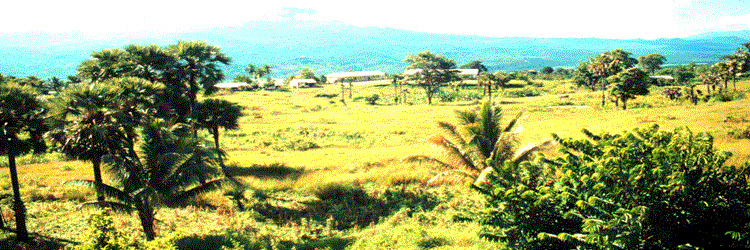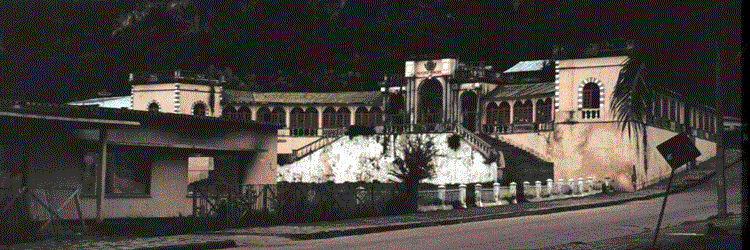It is a bit crowded - about eight people in the back of a small Mitsubishi van, sitting along the sides facing each other, our feet on sacks with rice, next to me there is a middle-aged man in neat clothes, wearing an expensive seeming watch. Across the isle an old man with the red-colored lips from chewing that plant. Direct opposite me is a young guy, holding a rooster and both of them looking extremely fierce. In fact, the guy doesn't stop for a second burning holes with his eyes in my face, somehow making me expect things to turn nasty any moment.
The bemo stops every 300 m or so, people get off and jump on. A teenage boy looks inside, sees there is hardly any room left and climbs on the roof of the van. The whole journey is accompanied by loud music, to me a mix of Indian, Turkish, Greek and - probably - Portuguese sounds. Maybe that's just standard South-East Asian tunes, who knows. Played at max volume and bass, it is really unpleasant and apparently not only to me.
The instrument panel of the dashboard is filled with cassette tapes, like books on a shelf, totally obscuring the view of gauges or indicators. When the driver changes the tape and the music starts again after some seconds of silence, the old gentleman next to me gives a deep sigh, looks at me, shakes his head and looks at the ceiling in a resigned way.
Sitting with my back to the window, I can't catch a lot of the landscape. I see some rice fields, and later on forests, as we commence the ascent to Baucau.
After a stop, two schoolgirls sit across from me, next to the rooster-guy. They are probably 12 or 13 years old and it's an incredible contrast - the girls wear neat snow-white uniforms, smile at me, are quite pretty and emit that civilised feeling I felt in the catholic convent the other day, whereas the guy with the chook on his lap is still hatefully staring into my eyes.
The girls look at me, whisper something to each other and start giggling. This goes on for about ten minutes and then the combination of stares and giggles finally deprives me of any confidence I had at the beginning of the day.
I ask helplessly into the van how far Baucau is, for we've been on the bemo for more then 45 minutes. My chicken-holding fan says in good English, that it'll be another 10 minutes and provides me with more useful information, especially where the police is and promises to tell me where to get off.At that stop I pay the 5000 rupees and walk up to a white modernist building, a former hotel, now with a lot of landrovers in front of it and the unmistakeable blue UN flag on top. Being shown where the police is, I walk there and see a big round man in police uniform. He has a shaven head and an emblem "?sterreichische Polizei" on his sleeve. His UN-name-badge says only "Croco". We start speaking, in German. The guy is friendly, happy to see a new face, happy to chat in his own language. After hearing him speak in bad English to someone else I understand why... He shows me into his office, a former hotel room with a sweeping view all the way down to the ocean, there is another man in Austrian police uniform, this one with a "Bundersgendarmerie" badge on the sleeve. He is absorbed with the Windows Solitaire game, but listens to me for half a minute and asks me whether I own a travel document, his face having the familiar lack of expression of the immigration officer. I say, sure, I've got a passport and continue my conversation with Croco, but am interrupted by an outstretched hand. Croco shuts up, obviously that other guy is in charge.
He takes my passport and starts studying the stamps in it. Hey, he says, Hungary! And looks deep into my eyes. I admit. Slovak republic! Yes. Oh-oh! born in Sofia?! Hmmmmmmmmm.
That obviously does it.
He goes out of the room, comes back with a photocopy of the passport and starts asking questions. Where did you arrive? When? Why? Why didn't you report to the police in Com? Name of the yacht? Name of the skipper? Can you prove any of that?
All the answers are being written down arround the copy on the sheet. He leaves the room again, passport still in his hand. After five minutes he is back, I ask him whether he's run it through the immigration computer of East Timor, in my most carefully sarcastic voice. No, he says, unfortunatelly we don't have the Schengen computer arround here. On the verge of asking when East Timor became a member of the European Union, Croco saves me by offering me a bottle of mineral water.
I get some advice on restaurants, leave my backpack at that office (safest place on earth) and hit Baucau.Baucau is a steep place, its center is a couple of blocks away and is dominated by the Mercado Municipal, a monumental building with all the barok elements one would expect from old colonial architecture. It is situated on a steep site with main access from the street above it and is basically a big terrace or balcony, attached to that street. But it has windows and a large covered area and is presently not being used. Down the slope along the steep streets are more old buildings, some of them badly damaged, some not. There is a brand new hotel-like structure across a street with a big French garden being dug and planted at the moment, at least 20 men work there.
It is about lunchtime, I find the restaurant the Austrians recommended and sit at a table. The prices are 5 times higher than in Los Palos, I order the cheapest meal for about $6 and start writing in my sketchbook my latest impressions. Still under influence, I write in big letters "Baucau - the local police - the best in the world - Austrian" and feel that someone is to look over my shoulder any moment now. It is mister Gent d'Arme himself, giving me a bit of shock, to say the least. They sit at the table, later we are joined by four more policemen - two British and two Americans. One of the US-guys has a Slavic face and ?vejk-moustache. His badge reads Havel.
The conversation is dominated by the Brits, the Americans obviously enjoying the English way of speech, the Austrians hardly able to cope with the speed of words.
Apparently, the 500 UN landrovers, a gift from Japan, can't really survive the rough driving circumstances, especially since no maintenance is provided. If a vehicle breaks down, it is just being left somewhere in front of a police station. (I saw that in Los Palos myself.) So now India, having heard complaints about the small number of vehicles, sends a gift, too - 200 Tatas, an Indian made four-wheel-drive. The whole UNTAET force is expecting the worst from these cars, but the most appalling issue is their color - the Tatas are being painted brown with a green line or something like that. "They look utterly ridiculous !".

